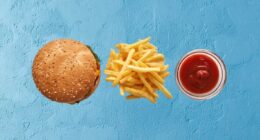The great news is that some of these drinks are actually worth making a little extra room in the fridge—and for more than just thirst-quenching hydration. Case in point: Ruby, the hibiscus beverage brand that’s putting the fun in functional beverages. It almost goes without saying I was instantly drawn to the prospect of a new, more exciting way to consume hibiscus, considering it’s an ingredient that’s long been touted for its impressive health benefits—it’s high in antioxidants and packed with vitamins, to name a few. (Its snazzy packaging and branding also helped.)
So, how about we crack open a can of sparkling hibiscus soda while delving into the benefits of the drink with help from a registered dietitian?
What’s inside a can of this hibiscus water soda
First things first, let’s delve into the product. Ruby is a hibiscus beverage brand that sells a variety of products ranging from functional sparkling sodas to infused water. Today, I’ll be honing in on their line of sparkling drinks, which are free of artificial ingredients, preservatives, and sweeteners, and come in a variety of flavors (including Original, Berry Cherry, Fuji Apple, Concord Grape, and Blood Orange). According to the makers behind Ruby, the drink was formulated to contain over 1,000 antioxidants like beta-carotene and vitamin C, as well as additional vitamins, minerals, and electrolytes.
Health benefits of hibiscus drinks, according to a registered dietitian
While hibiscus soda is a novel product, consuming hibiscus in other ways (like tea) is far from new in many parts of the world. In fact, it’s a globally-enjoyed beverage in many cultures, including preparations like chicha de saril in Panama, karkadé in North Africa, and agua de jamaica in North, Central, and South America, to name a few.
In addition to its delicious flavor and sunny magenta hue, Lauren Manaker, MS, RDN, LD, CLEC, CPT says that hibiscus is rich in health benefits (especially the sepals that protect the bud of the flower—this is the edible portion of the plant). “Hibiscus water, in its purest form, can be a hydrating beverage with some impressive features and benefits. Hibiscus water is a natural source of antioxidants and, therefore, may help protect your cells from oxidative damage,” Manaker says.
What’s more, hibiscus contains vitamin C and an anti-inflammatory plant compound known as anthocyanin, which gives the plant its gorgeous color. “Anthocyanin has been linked to heart health and brain health benefits,” says Manaker. That said, like most things in life, consuming hibiscus in moderation is key. (Many common preparations of hibiscus drinks include an excessive amount of sugar, which Manaker notes is best to limit.)
READ RELATED: Is a Smoothie Actually Enough To Be Considered a Balanced Breakfast? Here’s What an RD Has To Say
So, how does Ruby stack up against other hibiscus drinks?
From a Manaker’s perspective, Ruby is a fun alternative to sparkling water or even soda, especially for those who like the effervescence of a hydrating drink (with a few functional benefits). “The brand offers varieties that contain no added sugar, which makes for a sweetener-free option that is free from anything artificial,” Manaker says.
That said, she points out that some of the flavored options can contain up to 10 grams of added sugar. “The American Heart Association [AHA] recommends that most limit their added sugar to around 25 grams per day. While this drink will be a better option than a traditional soda—which can contain over 30 grams of added sugar per can—it’s still contributing almost 40 percent of the limit of added sugar a person should be consuming every day per this association,” Manaker says. All to say: If you’re concerned about added sugar, go for Ruby’s unsweetened options. It’s really a matter of personal preference.
I tried hibiscus water soda, and here’s what I thought
From a flavor perspective, there’s no denying that Ruby’s sparkling hibiscus water drinks are a ten out of ten. My favorite was the Fuji Apple option which was perfectly fizzy and tasted sweet and slightly tangy, like a freshly-picked apple from the orchard. As Manaker pointed out, this drink was sweet (has 10 grams of sugar per serving derived from organic fruit)—but not in an offensive way. To that end, the product is only made with three ingredients: water (we love her), organic apple juice, and organic brewed hibiscus. Plain and simple.
On days when I’m well below my sugar intake for the day, this drink is the perfect thing to sip on. It’s super tasty, hydrating, and packed with antioxidants. Honestly, do I wish it contained less sugar? Not really. Considering it comes from natural food sources and tastes so darn great, I’m not too worried as long as I simply consume it in moderation. The perk of adding a bit of hibiscus into my daily routine is convincing enough for me. And, when I’m worried about consuming too much sugar in a day, their Unsweetened Hibiscus Water will do the trick.
How to make a quick and easy anti-inflammatory ginger shot:
Source



